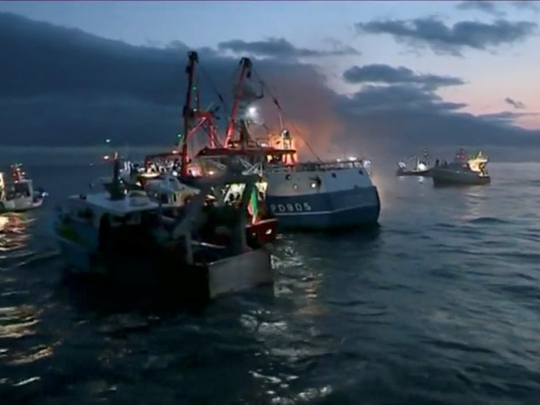
If you stand on the shores of France at Calais, you can see the white cliffs rise up at Dover to the north across the English Channel less than 20 kilometres away.
The English and the French have been enemies and allies down the centuries. But now, once more, they are at war. Of sorts.
The French Navy, the government in Paris says, is ready to come to the assistance of its fishermen after a nasty clash between them and the Brits. You see, the seabed in the Baie de Seine is rich in scallops — and the succulent shellfish catch a merry price across Europe.
And where there’s money, there’s competition.
The French fishermen use smaller boats and use small rakes to trawl the sea floor for the shellfish. And right now, there’s a seasonal prohibition in place for the French fishing fleet that lasts from May 15 to October 1 annually. But an armada of boats did put to sea last week to take on some bigger British boats that tried to fish for scallops. That seasonal closing of the beds doesn’t apply to the Brits. And those bigger boats use a different method to bring in the scallops — a dredge that cuts across the sea floor, a device, the French say that destroys the sea bed for years, taking in even smaller, immature shells that their rakes leave behind.
As well as being less damaging and using more sustainable methods, the French catch is landed daily and the scallops are on plates within 24 hours. The British fleet also has some factory boats that process and freeze the delicacy for future use and onward sale across the European Union (EU). The ironic thing is that the Brits are playing by the rules of the EU, which allows for open access for goods and foods — a regimen that the British fleet opposed in forcefully backing the Brexit option.
During the most recent sea skirmishes, the British boats were rammed while the French threw projectiles and pejoratives. Either way, the French have put their navy on alert to project their compatriots. It’s not the first time the Brits and the French have squared off in the scallop wars, but it is the most serious escalation since October 2012 when tempers flared last.
What the scallop war does do, however, is highlight the difficulty that Europeans and the Brits face now — and even more so, come Brexit — over fishing rights. British fishermen were among the most ardent voices in support of leaving the EU. They argued long and loud that the Common Fisheries Policy (CFP) favoured continental fleets — but scallops are one of the few species in all Europe’s waters that are governed by national rather than EU regulations.
The British ships can’t come into French waters
While the British fishing fleet has no access to French territorial waters up to 22 kilometres from the coast, it can come into the rich waters in the Baie de Seine that stretches from the Normandy peninsula of Cherbourg to the east at Dunkirk.
The last time the scallop wars erupted, representatives from both fleets did hammer out a temporary annual agreement. But with the Brits leaving the EU one way or another or in one form or another come March 29 next, there’s no appetite on either side of the Channel for a new scallop deal — and hence the hostilities.
But the entire fishing policy is confusing, and will become even more so.
As part of the transition deal reached between London and Brussels last March, Britain has agreed to remain in the EU’s CFP for the 20 months after next March 29 — something that the British fishermen are opposed to. They want to come out on Brexit day itself, not on December 31, 2020, when the transition period expires fully. Like most other things connected with the Brexit negotiations, there is no deal on what will happen come March 29.
For now, Britain and the other coastal nations of the EU retain equal access to all waters, and can buy and sell fish freely — for now. And there is no agreement yet on just how the final deal — if indeed there is one — will divide up the fishing map.
The hard-line Brexiteers want the government of Prime Minister of Theresa May to retain full control of its catch within its own waters and to ban all other boats. Right now, however, the British government’s position is that it plans to allow EU boats to fish in its waters but it will carefully control — and patrol — access. Brussels favours the current status quo.
Fish, of course simply go with the flow, but the stocks are carefully managed, with countries swapping quotas between the EU states and others in the broader European economic zone that includes Iceland, Norway and the Faroe Islands.
There’s also another complicating factor in all of this. Since joining the EU, British palettes have evolved to favour species found elsewhere, while Europeans have a taste now for the cold water species found in British coastal waters. Indeed, 75 per cent of the British catch is exported to the EU — and who knows what will happen come Brexit. It’ll be one thing to catch and land the fish in British ports — another more difficult thing to export it to the broader EU market the fishermen voted in droves to leave.








